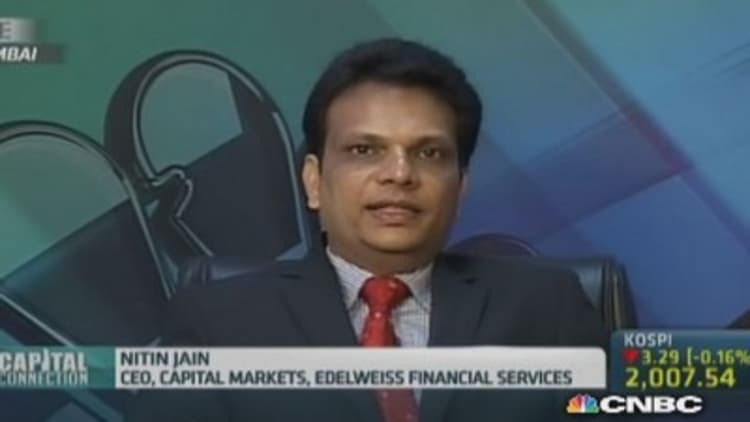
Optimism surrounding the prospect of a fresh Indian government has set Indian stocks on a tear, but one analyst told CNBC stocks are due for a 7 to 8 percent correction once the euphoria of the elections dies down.
India's official parliamentary election results will be released on Friday, and the market has priced in a strong win by the charismatic Narendra Modi, and his Bharatiya Janata Party (BJP) led National Democratic Alliance (NDA) alliance, which is considered more investor friendly than the incumbent Congress party.
Indian equities powered 3.3 percent higher soon after open on Friday, hitting fresh record highs. Over the past three months, Indian equities have surged around 22 percent in anticipation of a Modi win, while the rupee has gained near 5 percent against the dollar year to date making it one of the best performing emerging market currencies. But some analysts told CNBC they were concerned that any disappointment on these expectations could lead to pain for investors.
Read MoreModi on track forwin in India's huge election
"The markets have already factored in a significant part of Modi coming in with a very, very clear majority... I would not be surprised to see at least a 7-8 percent kind of correction if the market does not see at least 230 plus [seats won]," said Nitin Jain, chief executive officer of capital markets at Edelweiss Financial Services, referring to the number of seats BJP-NDA is expected to secure in India's lower house of parliament.
Although Modi is the clear frontrunner in the world's largest democratic exercise in history, all eyes will be on the margin of his victory. Polls have predicted the BJP-NDA alliance will win with a simple majority at 276 seats, with the BJP getting 232 seats. An alliance requires 272 seats to gain a majority of the 543 seats in India's lower house of parliament. If a majority is not achieved it could make it difficult for policies to be pushed through quickly.
Read MoreAre expectations for Modi's India getting unrealistic?
According to Jain, markets will likely give Modi a three month grace period, but after that period has subsided stock prices could begin to consolidate and drift lower.
"I think the first three months post this news will still be euphoria, people will still believe in the expectations that have been set - it's only after that three-month period has passed that people will start to realize that a lot of things will take some time to change," he said.
Modi's economic agenda has encouraged investors. His plans include reviving the manufacturing sector to create millions of jobs, reforming labor laws that make it difficult to fire employees and ploughing money into infrastructure.
Read MoreIndian elections:Will Narenda Modi revive India's economy?
But according to Nicholas Spiro, managing director at Spiro Sovereign strategy, there is a danger that investors have been too easily seduced by Modi and his business friendly policies.
"The big question is whether investors have gotten ahead of themselves in pricing in a strong victory for the BJP-led National Democratic Alliance (NDA) and, more importantly, whether their expectations about Mr Modi's ability and willingness to deliver much-needed fiscal and structural reforms are too high," he said.
Read MoreModi on course to be India's next leader, exit polls show
"While they're likely to be proved right on the former, they're almost certainly going to be disappointed on the latter," he added.
Spiro highlighted the risk that markets have placed too much faith in Modi himself as a politician, and disassociated him from his party, which has in the past show ambivalence towards reform, been vague about its fiscal and economic agenda, and been opposed to foreign investment in India's retail sector.
Read MoreWill social media be a game changer for India elections?
"There's an inescapable feeling that Mr Modi, although very much a can-do politician, doesn't have a much-needed political support base for ambitious reforms," said Spiro.
"The "Modi mania" that has gripped India over the past several months could turn into a BJP let-down," he added.
Edelweiss Financial Services' Jain still sees Indian equities as an attractive long-term buy, however, and advises investors to buy on dips. He favors mid-cap companies, with sound balance sheets and strong business models, which he sees rallying 20-30 percent over the next 2-3 years.
Modi currently serves as the chief minister of the north western state of Gujarat where he demonstrated decisive leadership and a dedication to improving infrastructure.
Read MoreRead MoreIndia startups brave the new world of wearables


